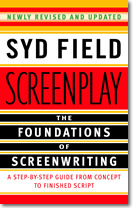THE PARADIGM WORKSHEET
Listen to “The Paradigm: A Brief Introduction”
“Screenplays are structure.”
— William Goldman
Dramatic structure is the foundation of screenwriting.
The word itself means “to build, or put together,” and understanding how it works is essential to the craft of screenwriting. Simply put, structure holds the story together; there is a beginning, middle and end, (not necessarily in that order), and a point at which the beginning turns into the middle, and the middle turns into the end.
That point is called a Plot Point. It is any incident, episode or event that hooks into the action and spins it around into another direction; in this case, either Act II or Act III.
There are many plot points in a screenplay, but in the creation of the story line, the most important are Plot Point I and Plot Point II. The four elements of structure, beginning, Plot Point I, Plot Point II and the ending, will always hold your story in place.
This is illustrated on the Paradigm, a model of what a screenplay is if you look at it like a painting hanging on the wall. The Paradigm of The Shawshank Redemption shows you how it works.Simply download the blank Paradigm and use the few brief exercises as an opportunity of practicing the craft of dramatic structure.
Sincerely,
DOWNLOADS
PDF Worksheets & Exercises (Acrobat Reader Required)
“The Paradigm Worksheet” – The Blank Form
“The Paradigm Worksheet” – The Shawshank Redemption
“The Paradigm Worksheet” – Exercise #1
“The Paradigm Worksheet” – Exercise #2
“The Paradigm Worksheet” – Exercise #3
“The Paradigm Worksheet” – Exercise #4




This post has 1 Comment